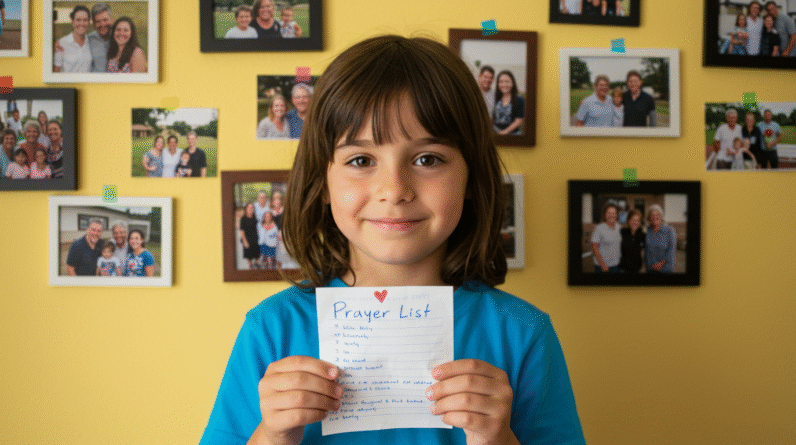Why Honesty And Integrity Matter In Faith-Based Parenting
Hello, dear reader! If you’re here, chances are you’re on a journey of faith-based parenting, which in itself is an adventure. No manual or step-by-step guide can completely prepare you for the path of raising children in alignment with Christian values. Among the many virtues you may wish to instill in your little ones, honesty and integrity emerge as critical components. They are the linchpins in the structure of faith-based parenting, guiding your children to trust and follow God. So, pull up a chair, and let’s have a heart-to-heart about why these qualities are so vital.
The Foundation of Faith-Based Parenting
Faith-based parenting is more than just a practice; it’s a way of life. It involves nurturing children not just physically or emotionally, but also spiritually. The essence of faith-based parenting lies in guiding young souls towards a life steeped in the teachings of Christ.
At its core, faith-based parenting is akin to building a resilient and unwavering house of faith. You start with a foundation, and what could be more foundational than the virtues of honesty and integrity? Through these virtues, children learn to distinguish right from wrong, truth from lies, and develop an innate moral compass aligned with Christian teachings.
Modeling these virtues before your children ensures that they recognize their importance and see them as not just ideals to aspire to, but as necessities in their everyday lives. It sets the tone for the kind of adults they will grow up to be—honest, trustworthy, and steadfastly committed to their faith.
Jesus as the Ultimate Model of Integrity
In the Christian context, if we talk about any virtue, the example of Jesus Christ is unavoidable. Jesus never shied away from living out what He preached. He exemplified unwavering honesty and integrity throughout His ministry. Emphasizing John 14:6, where He declares, “I am the way and the truth and the life,” serves as a reminder of this truth. Jesus not only spoke of truth, but He lived it.
Integrity is about consistency in actions, values, methods, and principles—something Jesus demonstrated exponentially. His life was a seamless blend of authenticity and devotion, a robust model for imitation. When children see you, as their parent, striving to emulate His character, they realize that living with integrity is not just a suggestion but a conviction. By mirroring Jesus’s example, you show your children a tangible representation of what it means to live with integrity.
The Role of Honest Communication
Let’s journey into your everyday abode—the living room, the kitchen table, the car rides to school. These places are prime real estate for honest communication. You may not realize it, but these casual spaces and moments can become gospel centers.
Faith-based parenting thrives on honest communication. Speak the truth, even when it’s hard or inconvenient. Let your children see that truth isn’t always wrapped neatly in perfection; sometimes, it’s raw and challenging. In doing this, you’re teaching them the invaluable lesson found in Ephesians 4:25, “Therefore each of you must put off falsehood and speak truthfully to your neighbor, for we are all members of one body.”
Your conversations, guided by honesty, become a safe space for children to express their fears, doubts, and questions about faith. They learn to verbalize their thoughts sincerely, nurturing an honest relationship with God and those around them. You’ll find that, as a parent, your faith-based values naturally permeate through these interactions.
Trust: The Bedrock of Relationships
As a cornerstone of faith-based parenting, trust fortified by honesty and integrity is indispensable. When trust forms the foundation of your household, relationships become a fortress of solace, love, and grace.
Envision a mural painted in trust’s colors, one that starts with small brushstrokes—such as keeping promises, owning mistakes, and speaking truthfully—each stroke adding depth and vibrancy to family life. The sustenance of such trust ensures children feel secure and valued. They learn, through the vehicle of your actions, that they are loved unconditionally.
Moreover, trust deepens their relationship with God. When your children learn to trust in you, as a reflection of God’s trustworthiness, they find it easier to trust in God’s promises. The scenario of being able to rely on you to be truthful and fair helps them to delve deeper into their faith journey with confidence.

Ensuring Consistency Between Heart and Actions
The essence of integrity lies in consistency between heart and actions. Faith-based parenting requires more than just vocal affirmations of faith; it demands a lived-out faith. It’s about being consistent in what you preach and what you practice.
Your actions at home, in church, and the broader community present your children with a seamless narrative of what faith looks like in action. Let’s take James 1:22 into consideration: “Do not merely listen to the word, and so deceive yourselves. Do what it says.”
Children are amazingly perceptive. They notice when your “faith walk” diverges from your “faith talk.” By ensuring that your heart aligns with your actions, you help them grasp a holistic understanding of integrity. They learn that integrity involves living an authentic life that is not bifurcated or hypocritical.
The Influence of Peers and Society
The world outside can be a loud place, filled with alluring voices and varying values, some of which may be in stark contrast to those of faith-based parenting. You can’t shield your children from such influences forever, nor should you wish to hide them entirely, because those instances can become great learning moments.
Teaching your children the importance of honesty and integrity helps them navigate societal pressures with a moral compass aligned to Christian values. They learn to filter influences through a lens of honesty and integrity, as emphasized in Philippians 4:8, which reminds us to focus on what is true, noble, and right.
Guide them to discern right from wrong, not merely by damage control but through proactive engagement. Encouraging them to question what they hear and see with a heart driven by truth and integrity empowers them to grow into adults who can stand resolutely amidst societal pressures.
The Blessings of Honoring God’s Truth
God’s truth is unchanging and remains the same throughout the ages. Instilling in your children the importance of living by God’s truth is a step forward in deepening their faith. The aspect of honesty and integrity is intricately tied to honoring God’s truth.
Take Proverbs 12:22, for instance, “The Lord detests lying lips, but he delights in people who are trustworthy.” This verse underscores the importance of being truthful and the blessing it brings in the eyes of God.
When children understand that honesty and integrity resonate with God’s truth, they recognize that living a life of faith is not just about adherence to rules. It’s about embracing a lifestyle that glorifies God. This begins with little steps: admitting when they’re wrong, standing by their word, and choosing the truth, even when it costs something.
Developing an Eternal Perspective
Faith-based parenting with a focus on honesty and integrity does more than just mold earthly character; it shapes an eternal perspective. It’s about teaching children to think beyond the here and now, to consider their actions within the context of eternity.
Without an eternal perspective, values can become transient, swayed by circumstance or convenience. However, with the understanding of eternity, children grasp the significance of living with integrity, as articulated in 2 Corinthians 4:18: “So we fix our eyes not on what is seen, but on what is unseen, since what is seen is temporary, but what is unseen is eternal.”
This perspective isn’t cultivated overnight but is built through consistent modeling and teaching. Helping children understand that their lives hold weight not only in the present but in the eternal scope is a powerful motivator for living with honesty and integrity.
Addressing Failures with Grace
Let’s embrace the truth—nobody is perfect, and failure is an inevitable part of life. In the realm of faith-based parenting, how you handle your own failures and those of your children can profoundly impact their understanding of honesty and integrity.
Failure must become a teacher rather than a terror. When mistakes happen, address them with grace and truth. Acknowledge the mistake, accept responsibility, and seek forgiveness and resolution. In doing so, you are exhibiting the redemptive power of grace and demonstrating the biblical principle found in 1 John 1:9: “If we confess our sins, he is faithful and just and will forgive us our sins and purify us from all unrighteousness.”
This approach teaches children that failure is not final, but an opportunity for growth and a deeper understanding of God’s grace. By witnessing this first-hand, they learn that owning up to faults is part of living with integrity.
Empowering Independence and Responsibility
As your children grow, they will begin making decisions independently. As they step outside the circle of your direct influence, the lessons they’ve internalized about honesty and integrity will manifest in their choices.
Faith-based parenting with a foundation in these virtues prepares them for this independence. It instills in them a sense of responsibility, not just for their actions, but for their spiritual journey as well. They learn that honesty isn’t just about personal integrity; it’s about honoring God in all things.
In Galatians 6:4-5, we find encouragement to take responsibility for our conduct. “Each one should test their actions. Then they can take pride in themselves alone, without comparing themselves to someone else, for each one should carry their load.” The beauty of faith-based parenting lies in empowering them to carry their load with grace and integrity.
Concluding Thoughts: Every Step Counts
As you journey through the path of faith-based parenting, remember that each step counts. Every lesson on honesty and every act of integrity form a crucial building block in your child’s life. They learn from the cadence of your voice, the choices you make, and the love you extend.
In the end, faith-based parenting is a labor of love, one where honesty and integrity are not merely words, but a way of life. Through it, you raise children who not only talk about faith but live it authentically, embodying the love and truth of God in ways that echo into eternity.
Explore More
For further reading and encouragement, check out these posts:
👉 7 Bible Verses About Faith in Hard Times
👉 Job’s Faith: What We Can Learn From His Trials
👉 How To Trust God When Everything Falls Apart
👉 Why God Allows Suffering – A Biblical Perspective
👉 Faith Over Fear: How To Stand Strong In Uncertain Seasons
👉 How To Encourage Someone Struggling With Their Faith
👉 5 Prayers for Strength When You’re Feeling Weak

📘 Jesus and the Woman Caught in Adultery – Grace and Mercy Over Judgement
A powerful retelling of John 8:1-11. This book brings to life the depth of forgiveness, mercy, and God’s unwavering love.
👉 Check it now on Amazon
As a ClickBank Affiliate, I earn from qualifying purchases.
Acknowledgment: All Bible verses referenced in this article were accessed via Bible Gateway (or Bible Hub).
“Want to explore more? Check out our latest post on Why Jesus? and discover the life-changing truth of the Gospel!”








